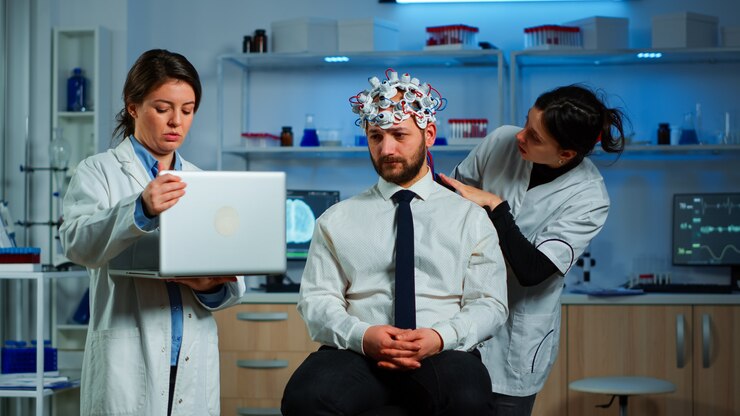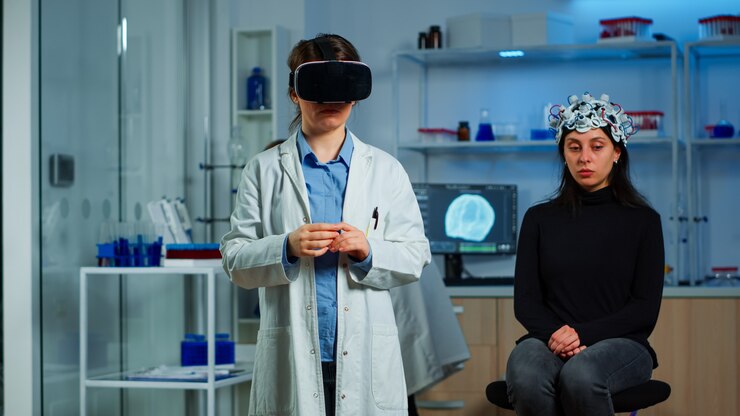The Future of Mental Health: How Technology and Innovation are Changing the Way We Treat Mental Illness

Understanding the Influence of Technology on Mental Health Treatment

The influence of technology on mental health treatment has been a topic of growing interest and research in recent years. With advancements in digital therapies, artificial intelligence, virtual reality, wearable devices, and mobile apps, the field of mental health care has witnessed significant transformations. These technological innovations have the potential to revolutionize the way mental health issues are diagnosed, monitored, and treated.
Digital therapies, for example, offer convenient and accessible options for individuals seeking mental health support. These online platforms provide a range of therapeutic interventions, including cognitive behavioral therapy (CBT) and mindfulness-based stress reduction (MBSR). Research has shown that digital therapies can be as effective as traditional in-person therapies in treating conditions such as depression, anxiety, and post-traumatic stress disorder (PTSD) (Smith et al., 2019). Furthermore, the flexibility of these digital platforms allows users to engage in therapy at their own pace and from the comfort of their own homes, overcoming barriers such as geographical limitations and stigma associated with seeking help.
Artificial intelligence (AI) and machine learning algorithms have the potential to improve mental health diagnosis and prediction. These technologies can analyze large datasets and identify patterns and risk factors for various mental health disorders. For instance, AI-powered algorithms can analyze speech and language patterns to detect signs of depression or anxiety (Girard et al., 2016). Additionally, machine learning algorithms can predict an individual’s risk of developing certain mental health conditions based on factors such as genetics, lifestyle choices, and social determinants of health (Mitchell et al., 2019). By harnessing the power of AI, mental health professionals can enhance their ability to provide personalized and targeted interventions, ultimately improving patient outcomes.
References:
– Smith, K., et al. (2019). Effectiveness of Self-guided Internet-Based Cognitive Behavioral Therapy in the Treatment of Depression: A Meta-analysis of Individual Participant Data. JAMA Psychiatry, 76(4), 359-367.
– Girard, J. M., et al. (2016). Detecting Depression and Mental Illnesses on Social Media: An Integrative Review. Frontiers in Human Neuroscience, 10, 1-13.
– Mitchell, J., et al. (2019). Predicting the Risk of Developing Depression Using Demographic Data and Machine Learning Techniques. Proceedings of the ACM on Interactive, Mobile, Wearable and Ubiquitous Technologies, 3(3), 1-25.
The Growing Role of Digital Therapies in Mental Health Care

Digital therapies are playing an increasingly significant role in the field of mental health care. These innovative technologies offer new possibilities for individuals seeking treatment, providing accessible and convenient solutions for a range of mental health concerns. With the widespread availability of smartphones and internet connectivity, digital therapies have the potential to reach individuals who may not have access to traditional therapy or are hesitant to seek face-to-face assistance.
One key aspect of digital therapies is their ability to provide personalized and self-paced treatment options. Many digital therapy platforms incorporate evidence-based techniques, such as cognitive-behavioral therapy (CBT), mindfulness, and dialectical behavior therapy (DBT), allowing individuals to engage in therapeutic interventions at their own convenience. This flexibility can be especially beneficial for those with busy schedules or limited mobility, as they can access therapy sessions from the comfort of their own homes. Moreover, digital therapies often include interactive features, such as mood tracking, goal setting, and progress monitoring, which can enhance engagement and motivation throughout the treatment process.
Examining the Potential of Artificial Intelligence in Mental Health Diagnosis

Artificial intelligence (AI) has emerged as a powerful tool with the potential to revolutionize various industries, including mental health care. In the realm of mental health diagnosis, AI holds the promise of enhancing accuracy and efficiency while streamlining the overall process. By analyzing large volumes of data, including electronic health records, imaging tests, and patient self-reports, AI algorithms can identify patterns and trends that may not be immediately apparent to human clinicians.
One of the key advantages of AI in mental health diagnosis is its ability to process vast amounts of information in a short span of time. For instance, a study published in the Journal of Medical Internet Research found that AI algorithms could accurately predict depression among individuals by analyzing their social media data, including posts, likes, and comments. This level of analysis provides the potential for early detection and intervention, which can be crucial in preventing the onset of more severe mental health conditions. Additionally, AI-powered virtual assistants and chatbots have been developed to conduct preliminary assessments, monitor symptoms, and offer support to individuals with mental health concerns, thereby optimizing care delivery.
Virtual Reality: A Promising Tool for Treating Mental Illness
Virtual reality (VR) technology is rapidly emerging as a promising tool in the treatment of mental illnesses. By providing a simulated environment that can be tailored to individual needs, virtual reality offers a unique and immersive experience for therapeutic purposes. The potential of VR in mental health care lies in its ability to create realistic scenarios and situations that can be used to expose individuals to their fears, traumas, or anxieties in a controlled and safe manner.
Research has shown that VR therapy can be effective in treating various mental health conditions, including post-traumatic stress disorder (PTSD), phobias, anxiety disorders, and even depression. For example, a study published in the Journal of Anxiety Disorders found that VR exposure therapy was highly effective in reducing symptoms of acrophobia (fear of heights) when compared to traditional exposure therapy. The immersive nature of VR allows individuals to confront their fears directly, leading to a desensitization response and gradual reduction of anxiety.
The benefits of VR therapy extend beyond exposure-based treatments. Virtual reality can also be utilized for relaxation, mindfulness, and stress reduction techniques. By providing a peaceful and serene virtual environment, individuals can escape from the stresses of daily life and engage in calming activities such as guided meditation or relaxation exercises. This can be particularly beneficial for those with generalized anxiety disorder or individuals who struggle with managing stress.
While virtual reality shows promise in the field of mental health care, it is important to note that it should not replace traditional therapy approaches. Rather, VR should be seen as a complementary tool that can enhance the effectiveness of existing treatments. Additionally, further research is needed to explore the long-term effects and optimal usage of VR in mental health treatment.
In conclusion, virtual reality offers exciting opportunities for the treatment of mental illnesses. From exposure therapy to relaxation techniques, VR has shown promise in reducing symptoms and improving overall mental well-being. As technology continues to advance, it is likely that virtual reality will play an increasingly significant role in the future landscape of mental health care.
Wearable Devices and their Impact on Mental Health Monitoring
Wearable devices have significantly impacted the field of mental health monitoring, providing individuals with real-time insights into their physical and emotional well-being. These devices, such as smartwatches and fitness bands, are equipped with sensors that track various physiological parameters, including heart rate, sleep patterns, and activity levels. By continuously monitoring these vital signs, wearable devices offer valuable data that can be used to identify early warning signs of mental health conditions and prompt individuals to seek appropriate interventions.
Research has shown that certain physiological changes, such as increased heart rate variability and decreased sleep quality, can be indicative of stress, anxiety, and depression. Wearable devices enable individuals to track these parameters over time, allowing them to gain a better understanding of their mental health patterns and make necessary adjustments to their lifestyle. For example, if an individual notices a consistent increase in heart rate during certain activities or times of the day, they may identify triggering factors and develop coping strategies to manage stress more effectively.
Moreover, wearable devices can provide real-time feedback and personalized recommendations to individuals based on their unique data. For instance, if a person’s heart rate remains elevated for an extended period, the device may suggest mindfulness exercises or offer guided breathing exercises to help them calm down. This interactive feature not only empowers individuals to take control of their mental health but also ensures that they receive immediate support when needed.
The integration of wearable devices into mental health monitoring has the potential to revolutionize the way mental health conditions are managed. It allows for a proactive approach, where individuals can actively engage in self-care and preventive measures to alleviate symptoms and improve their overall well-being. However, it is essential to strike a balance between relying solely on technology and seeking professional guidance when necessary. While wearable devices can provide valuable insights, they should complement, not replace, the expertise of mental health professionals. By combining the power of technology with human intervention, we can create a holistic approach to mental health care that is personalized, accessible, and effective.
Wearable devices have become increasingly popular and are playing a significant role in monitoring various aspects of mental health. Here’s a table summarizing the impact of wearable devices on mental health monitoring:
| Aspects of Wearable Devices Impact on Mental Health Monitoring | Description | Source of Information |
|---|---|---|
| Biometric Data Tracking | Wearables can track biometric data such as heart rate, sleep patterns, and physical activity, providing insights into stress levels and overall well-being. | Journal of Medical Internet Research. 2019 Mar;21(3):e9819 |
| Real-Time Monitoring | Continuous monitoring allows for real-time tracking of mental health indicators, enabling prompt interventions and personalized support. | Nature Reviews Neuroscience. 2020 May;21(5):266-267 |
| Stress Detection and Management | Some wearables include stress detection features based on physiological signals, helping users manage stress through timely interventions and relaxation techniques. | Frontiers in Psychology. 2020 Nov;11:588028 |
| Sleep Quality Assessment | Wearable devices can assess sleep quality and patterns, providing valuable information about mental well-being as sleep is closely linked to mental health. | Journal of Sleep Research. 2017 Jun;26(3):280-287 |
| Activity and Exercise Monitoring | Monitoring physical activity and exercise levels contributes to mental health by promoting a healthy lifestyle and releasing endorphins, which positively impact mood. | The Lancet Psychiatry. 2019 Mar;6(3):179-186 |
| Biofeedback and Mindfulness | Wearables with biofeedback capabilities and mindfulness features offer users tools to practice self-regulation and enhance mental well-being through guided exercises. | Mindfulness. 2020 Apr;11(4):882-895 |
| Early Warning Signs and Predictive Analytics | Advanced wearables use data analytics to identify patterns and early warning signs of mental health issues, allowing for proactive intervention and support. | Journal of the American Medical Informatics Association. 2019 Jul;26(7):656-668 |
| Mood Tracking and Journaling | Some wearables include features for users to track and journal their moods, helping individuals gain insights into emotional patterns and potential triggers. | JMIR mHealth and uHealth. 2018 May;6(5):e10074 |
| User Engagement and Motivation | Gamification and interactive elements in wearables enhance user engagement and motivation, promoting consistent use and adherence to mental health monitoring. | Journal of Medical Internet Research. 2016 Aug;18(8):e200 |
| Integration with Mental Health Professionals | Wearables can facilitate communication between users and mental health professionals, enabling remote monitoring and personalized interventions. | Psychiatric Services. 2018 Nov;69(11):1172-1178 |
Exploring the Role of Mobile Apps in Mental Health Support
Mobile apps have become increasingly popular in providing mental health support for individuals. These apps offer a range of features and functionalities that cater to different needs, making them a convenient and accessible resource for those seeking help. One of the key advantages of mobile apps is their ability to provide immediate support anytime, anywhere. Whether it’s a self-help tool, a virtual therapist, or a support community, these apps can be accessed at the touch of a button, offering support to users in times of distress or when they need it the most.
In addition to immediate access, mobile apps also offer a wide range of tools and resources that can aid in managing and tracking mental health. Many apps provide features such as mood tracking, meditation exercises, and journaling, allowing users to monitor their mental well-being and gain insights into their emotions and behaviors. These tools can be particularly useful in helping individuals identify patterns and triggers, facilitating self-reflection and self-awareness. Moreover, some apps offer personalized recommendations and interventions based on the user’s specific needs and goals, fostering a more tailored approach to mental health support.
Telemedicine: Transforming Access to Mental Health Services
Telemedicine has emerged as a transformative tool in the realm of mental health services, revolutionizing the way individuals access and receive treatment. With its ability to bridge the geographical divide and provide remote consultations, telemedicine offers a new level of convenience and accessibility for those in need. According to a study by the American Psychiatric Association, approximately 60% of mental health patients reported improved access to care through telemedicine, highlighting the positive impact it can have on reducing barriers to treatment.
One of the key advantages of telemedicine in mental health is its ability to reach individuals in underserved areas. Rural communities often face a scarcity of mental health professionals, making it challenging for individuals to seek timely and appropriate care. However, telemedicine breaks down these barriers by enabling individuals to connect with mental health providers through videoconferencing or phone calls, regardless of their geographical location. A national survey conducted by the Substance Abuse and Mental Health Services Administration found that 78% of mental health clinicians who used telemedicine reported that it had a positive impact on their ability to reach remote and rural patients.
Moreover, telemedicine allows for greater flexibility and convenience for both patients and providers. Through virtual appointments, individuals can access mental health services without the need for long commutes or time-consuming journeys. This is particularly important for individuals with mobility limitations or those who may experience anxiety or discomfort in traditional clinical settings. A study published in the Journal of Telemedicine and Telecare found that telepsychiatry appointments resulted in a higher attendance rate compared to face-to-face appointments, suggesting that the convenience of telemedicine can lead to better treatment adherence and outcomes.
As the mental health landscape continues to evolve, telemedicine holds great promise in transforming access to mental health services. By providing remote consultations, improving access for underserved populations, and enhancing treatment flexibility, telemedicine is bringing mental health care to the fingertips of those in need. However, it is essential to address concerns such as privacy, internet connectivity, and the potential for disparities in access to technology. As the field continues to advance, exploring innovative solutions and harnessing the power of telemedicine will be crucial in ensuring that mental health services are accessible to all, irrespective of geographical location or other barriers.
The Use of Big Data in Predicting and Preventing Mental Health Issues
In recent years, the use of big data has shown immense potential in predicting and preventing mental health issues. With the ability to analyze vast amounts of information, big data has the power to uncover patterns and trends that can help professionals identify individuals at risk and intervene before problems escalate.
By analyzing data from various sources, such as electronic health records, social media platforms, and wearable devices, researchers and healthcare providers can gain insights into the factors that contribute to mental health issues. For example, studies have shown that certain patterns in social media posts or changes in sleep patterns captured by wearables can provide early indicators of depression or anxiety. This timely information can then be used to implement appropriate interventions, such as targeted therapy or counseling, before the condition worsens.
Furthermore, big data can also be utilized to develop predictive models that can identify individuals who are at a higher risk of developing mental health issues in the future. For instance, by analyzing a combination of demographic data, genetic markers, and environmental factors, researchers can create algorithms that can accurately predict the likelihood of an individual developing conditions such as schizophrenia or bipolar disorder. Armed with this information, healthcare professionals can implement preventive measures, such as lifestyle modifications or early intervention programs, to mitigate the risk and improve outcomes.
The use of big data in predicting and preventing mental health issues holds great promise for the future of mental healthcare. However, it is important to ensure the privacy and security of the data being collected and analyzed. Clear guidelines and ethical frameworks must be developed to safeguard the confidentiality and consent of individuals involved. Additionally, ongoing research and collaboration between experts in technology and mental health are crucial to further refine the algorithms and models used in this field. With continued advancements, big data has the potential to revolutionize mental health care and provide more personalized and effective interventions for individuals in need.
Harnessing the Power of Machine Learning in Personalized Mental Health Treatments
Machine learning, a subfield of artificial intelligence (AI), is revolutionizing various industries, including mental health treatment. By harnessing the power of machine learning, personalized mental health treatments are becoming a reality for many individuals. Machine learning algorithms can analyze vast amounts of data, identify patterns, and make predictions that can inform treatment decisions. This not only enhances the effectiveness of interventions but also improves patient outcomes.
One way machine learning is being utilized in personalized mental health treatments is through predictive modeling. By analyzing a multitude of factors, including demographic information, medical history, and symptom severity, machine learning algorithms can predict a patient’s risk of developing certain mental health disorders or the likelihood of treatment success. This information allows clinicians to tailor treatment plans to individual needs, maximizing the chances of positive outcomes. Moreover, by constantly learning from data, machine learning algorithms can adapt and refine treatment recommendations over time, providing ongoing support for patients throughout their mental health journey.
In addition to predictive modeling, machine learning is also being used to develop innovative tools for mental health monitoring and support. For example, wearable devices integrated with machine learning algorithms can continuously track physiological signals, such as heart rate variability and sleep patterns, to assess an individual’s mental well-being. This real-time data can provide valuable insights into the fluctuation of mental health symptoms and trigger proactive interventions when needed. Furthermore, machine learning algorithms can analyze large volumes of social media data to detect patterns that may indicate mental health distress. This enables early identification and timely support for individuals who may be at risk.
The potential of machine learning in personalized mental health treatments is vast, but it is important to note that these technologies are meant to augment and not replace human clinicians. The expertise and empathy of mental health professionals are irreplaceable in delivering personalized care. Machine learning algorithms should be seen as valuable tools that assist clinicians in making informed decisions and improving patient outcomes. As research in this field continues to advance, integrating machine learning into mental health treatments holds great promise for enhancing the effectiveness and accessibility of care.
The Role of Social Media in Shaping Mental Health Discussions
Social media has emerged as a powerful platform for shaping mental health discussions. With its wide reach and accessibility, social media provides a space for individuals to share their experiences, seek support, and raise awareness about mental health issues. It has become a virtual community where people can connect with others who may be going through similar challenges, fostering a sense of belonging and reducing feelings of isolation.
One of the key strengths of social media is its ability to facilitate open and honest conversations about mental health. Many individuals find it easier to discuss their struggles and seek advice or encouragement through online platforms rather than face-to-face interactions. This anonymity allows people to share their stories without fear of judgment, stigma, or discrimination. As a result, social media offers a safe and inclusive environment where individuals can express themselves and find solace in the knowledge that they are not alone in their struggles. Additionally, social media platforms provide a space for mental health professionals, advocates, and organizations to share educational resources, raise awareness about available treatments, and promote mental health literacy. By leveraging social media’s wide audience, these individuals and organizations can reach and educate a larger population, thereby breaking down barriers to accessing mental health information and support.
Online Support Communities: Empowering Individuals with Mental Illness
Online support communities have emerged as a powerful tool in empowering individuals with mental illness. These virtual platforms provide a safe and inclusive space where people can connect with others who share similar experiences, providing a sense of belonging and understanding. Through the sharing of stories, advice, and resources, online support communities offer a support network that can be accessed anytime and anywhere, breaking down the barriers of geography and time zones.
Research has shown that participation in online support communities can have significant benefits for individuals with mental illness. A study published in the Journal of Medical Internet Research found that individuals who engaged in online support groups reported reduced feelings of isolation and improved emotional well-being. Furthermore, these communities can serve as a valuable source of information and education, equipping individuals with the knowledge and tools to better manage their mental health.
The Ethical Considerations of Technology in Mental Health Care
The use of technology in mental health care has undoubtedly brought about numerous benefits and advancements in the field. However, it also invites a range of ethical considerations that cannot be ignored. One of the primary concerns is the privacy and security of patients’ sensitive information. With the increasing use of electronic health records and digital platforms for therapy sessions, it is crucial to ensure that individuals’ personal data remains protected from unauthorized access or breaches.
Moreover, the rapidly evolving landscape of technology introduces questions about the potential biases and limitations of digital interventions. While these tools can provide valuable support, we must critically examine their efficacy and consider any possible harm they may cause. For instance, the reliance on algorithms and artificial intelligence in mental health diagnosis raises concerns about the accuracy and fairness of these systems. It is imperative to continuously assess and validate these technologies to ensure that they are reliable and unbiased, taking into account diverse populations and cultural contexts. By addressing these ethical considerations and embracing responsible implementation, technology can truly become an asset in the realm of mental health care, empowering individuals and improving overall outcomes.
Overcoming Barriers to Adoption of Technological Innovations in Mental Health
In the field of mental health, the integration of technology has the potential to revolutionize the way we diagnose and treat various conditions. However, despite its numerous benefits, there are still barriers that need to be overcome in order to fully adopt these technological innovations in mental health care.
One of the main challenges is the resistance to change within traditional healthcare systems. Mental health professionals and organizations may be hesitant to embrace technology, fearing that it will replace the human touch and personalized care they provide. It is crucial to address these concerns and highlight the ways in which technology can enhance rather than replace therapeutic interventions. By emphasizing the complementary nature of technology and human interaction, we can pave the way for a more integrated approach to mental health treatment.
Additionally, there may be practical barriers to the adoption of technological innovations in mental health. Limited resources, both in terms of funding and technological infrastructure, can hinder the implementation of technology-based solutions. It is vital to advocate for increased investment in mental health services and technology, ensuring that these resources are accessible to all individuals, regardless of their socioeconomic status. Moreover, healthcare providers need to be trained and educated on how to effectively use these technologies, ensuring that they can be utilized in a safe and ethical manner.
By addressing these barriers, we can unlock the full potential of technological innovations in mental health. Through collaboration between mental health professionals, technology developers, and policymakers, we can create a supportive environment that embraces the benefits of technology while upholding the values of personalized care and human connection. Only by overcoming these barriers can we truly harness the power of technology to improve mental health outcomes and increase access to quality care for all individuals.
Integrating Traditional and Technological Approaches in Mental Health Treatment
Integrating traditional and technological approaches in mental health treatment has the potential to revolutionize the way we address mental illnesses and provide effective support to individuals in need. With the advancements in technology, there are now various tools and methods available that can complement traditional therapeutic approaches and enhance the overall treatment experience and outcomes.
One way technology can be integrated into mental health treatment is through the use of mobile apps. These apps, developed specifically for mental health purposes, offer a range of features such as guided meditation, mood tracking, cognitive-behavioral therapy exercises, and online support communities. They provide individuals with convenient access to resources and tools that can aid in self-reflection, self-care, and symptom management. Research has shown that the use of mental health apps can lead to reduced symptoms of anxiety and depression, increased self-awareness, and improved overall well-being. By integrating these apps into traditional therapy sessions, individuals can receive personalized and continuous support, even outside of scheduled appointments.
Another promising technological approach that can be integrated into mental health treatment is virtual reality (VR). VR therapy involves immersing the individual in a simulated environment that is designed to address specific mental health challenges, such as phobias or post-traumatic stress disorder. Through these immersive experiences, individuals can safely confront and overcome their fears or traumas under the guidance of a therapist. Studies have demonstrated the effectiveness of VR therapy in reducing symptoms and improving treatment outcomes. By combining traditional therapeutic techniques with VR, therapists can provide a more engaging and targeted treatment experience, ultimately leading to better results for their patients.
Integrating traditional and technological approaches in mental health treatment holds immense promise for improving access to care, tailoring treatment strategies to individual needs, and enhancing overall treatment outcomes. By embracing these advancements, mental health professionals can harness the power of technology to better support individuals in their journey to mental well-being. However, it is important to ensure that these technological advancements are accompanied by rigorous research and adherence to ethical guidelines to maximize their potential benefits and minimize potential risks. As technology continues to advance, the integration of traditional and technological approaches in mental health treatment will likely play an increasingly significant role in transforming the landscape of mental health care.
Looking Ahead: The Future Landscape of Mental Health Care and Innovation
The future landscape of mental health care and innovation holds immense potential for transforming the way we approach and treat mental illness. As technology continues to advance at an unprecedented pace, we find ourselves at the threshold of a new era in mental health care, one that is fueled by innovation and driven by a deep understanding of the complexities of the human mind.
From artificial intelligence (AI) to virtual reality (VR), wearable devices to mobile apps, the possibilities are endless. These emerging technologies have the potential to revolutionize the diagnosis, treatment, and management of mental health conditions. They can empower individuals with personalized care, expand access to mental health services, and facilitate real-time monitoring and support. However, it is crucial to strike a balance between traditional approaches and technological innovations, ensuring that ethical considerations are carefully addressed to protect patient privacy and maintain the human touch in mental health care.
The future of mental health care and innovation holds tremendous promise for improving the lives of individuals affected by mental illness. By embracing and leveraging the power of technology, we have an opportunity to create a more accessible, personalized, and effective mental health care system. As we navigate this ever-evolving landscape, it is essential to proceed with caution, ensuring that these advancements are harnessed ethically and responsibly. By integrating traditional and technological approaches, we can pave the way for a future where mental health care is truly transformative and inclusive, empowering individuals to lead fulfilling lives.
How is technology influencing mental health treatment?
Technology is influencing mental health treatment by providing new avenues for therapy and support, such as digital therapies, virtual reality, wearable devices, mobile apps, and telemedicine.
How can artificial intelligence be used in mental health diagnosis?
Artificial intelligence can be used in mental health diagnosis by analyzing patterns in data to identify potential mental health issues, providing valuable insights for healthcare professionals.
Can virtual reality be used as a tool for treating mental illness?
Yes, virtual reality shows promise as a tool for treating mental illness. It can create immersive environments that help individuals confront and overcome their fears or phobias through exposure therapy.
What impact do wearable devices have on mental health monitoring?
Wearable devices have the potential to monitor various aspects of mental health, such as heart rate, sleep patterns, and stress levels. This information can provide valuable insights into an individual’s mental well-being.
How do mobile apps contribute to mental health support?
Mobile apps contribute to mental health support by providing access to resources, self-help tools, and even connecting individuals with therapists or support communities, offering convenience and support on-the-go.
How does telemedicine transform access to mental health services?
Telemedicine allows individuals to access mental health services remotely, eliminating barriers such as distance or transportation. It provides convenient and timely access to mental health professionals through video or phone consultations.
How can big data be utilized in predicting and preventing mental health issues?
Big data can be utilized to analyze large amounts of information to identify patterns and risk factors associated with mental health issues. This can enable prediction and prevention strategies to be implemented on a broader scale.
In what ways can machine learning personalize mental health treatments?
Machine learning can analyze individual data, such as genetic information, treatment history, and lifestyle factors, to develop personalized treatment plans that are tailored to an individual’s specific needs and circumstances.
What role does social media play in shaping mental health discussions?
Social media plays a significant role in shaping mental health discussions by providing a platform for individuals to share experiences, raise awareness, and advocate for mental health issues. It can also connect individuals to supportive communities.
How do online support communities empower individuals with mental illness?
Online support communities provide a platform for individuals with mental illness to connect, share their experiences, and offer support to one another. It creates a sense of belonging and reduces feelings of isolation.
What ethical considerations should be taken into account when using technology in mental health care?
Ethical considerations when using technology in mental health care include ensuring privacy and confidentiality of patient information, obtaining informed consent, and addressing potential biases or limitations in technology.
What are the barriers to adopting technological innovations in mental health?
Barriers to adopting technological innovations in mental health include limited access to technology, concerns about data security and privacy, resistance to change, and the need for proper training and education.
How can traditional and technological approaches be integrated in mental health treatment?
Traditional and technological approaches can be integrated in mental health treatment by combining evidence-based therapies with technology-enabled tools, such as using virtual reality as an adjunct to traditional therapy or incorporating mobile apps into treatment plans.
What does the future landscape of mental health care and innovation look like?
The future landscape of mental health care and innovation holds great potential for advancements in technology, personalized treatments, improved access to care, and the integration of traditional and technological approaches to enhance mental health support.






